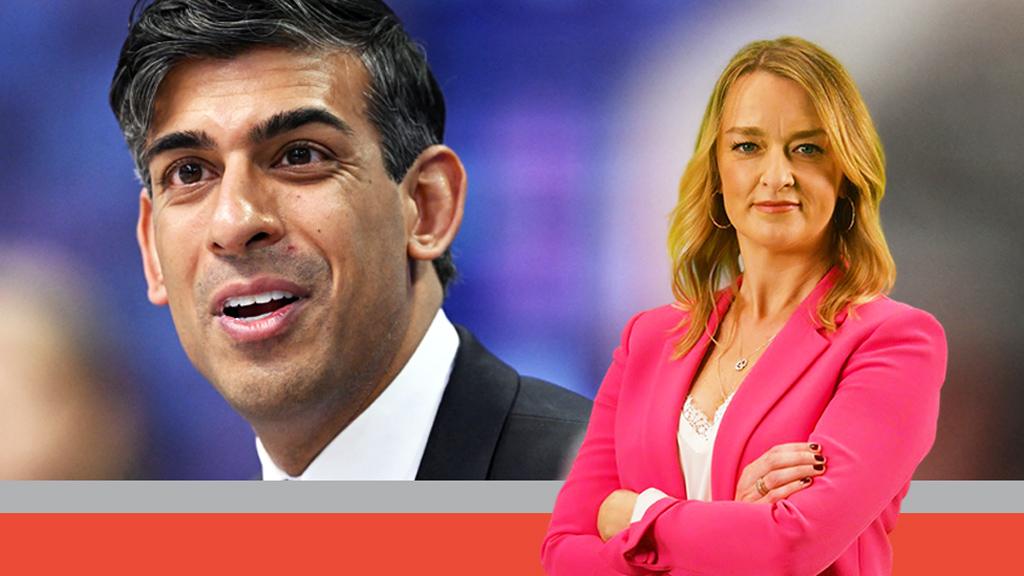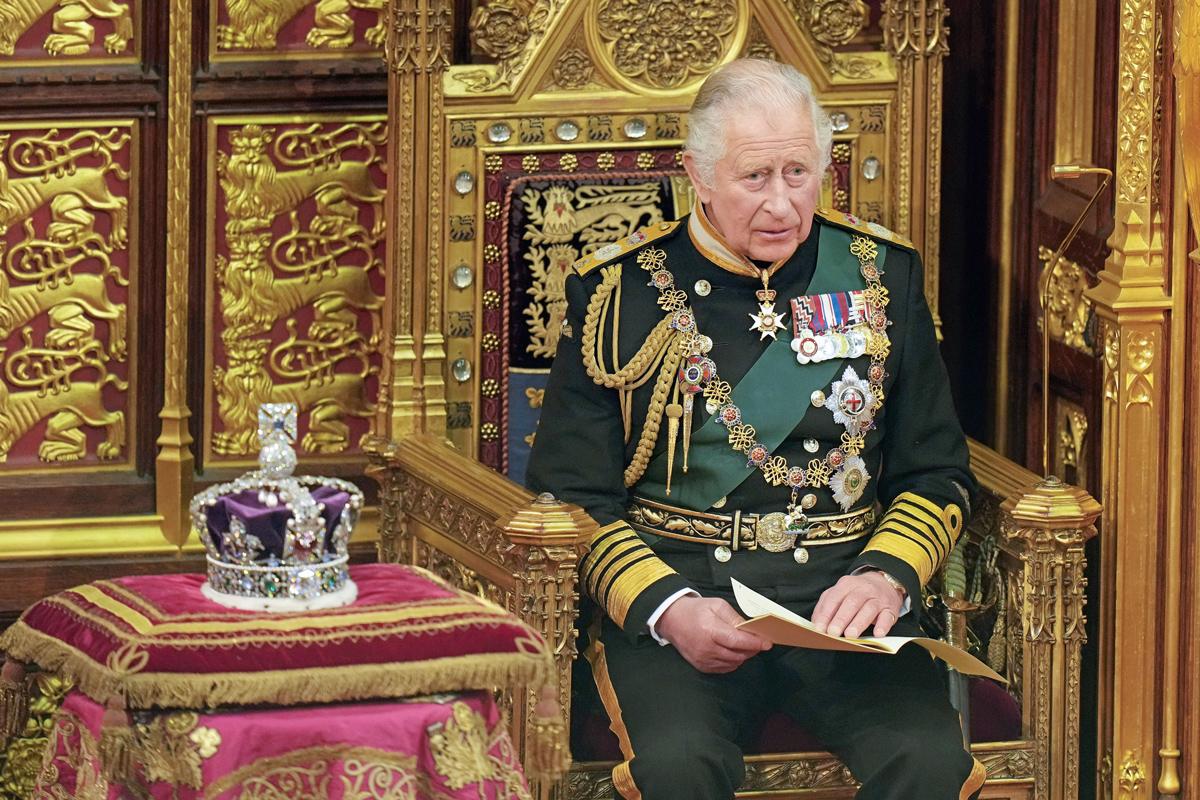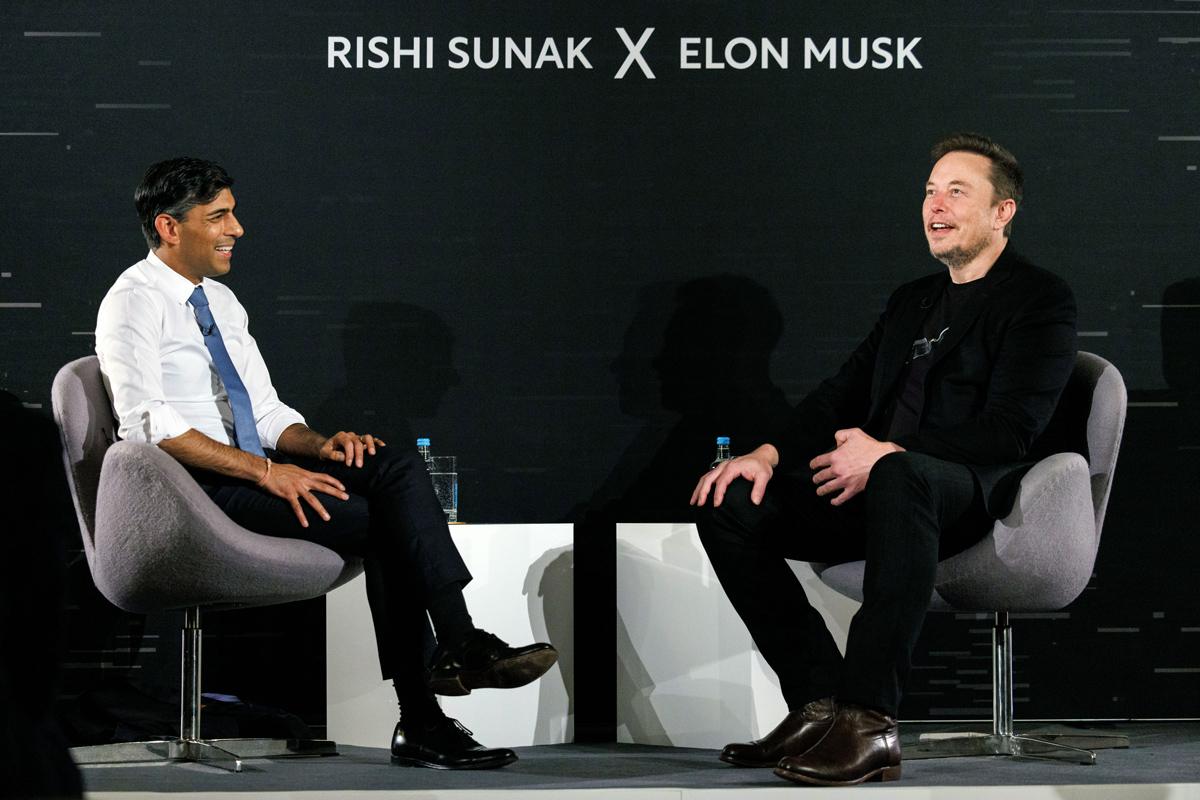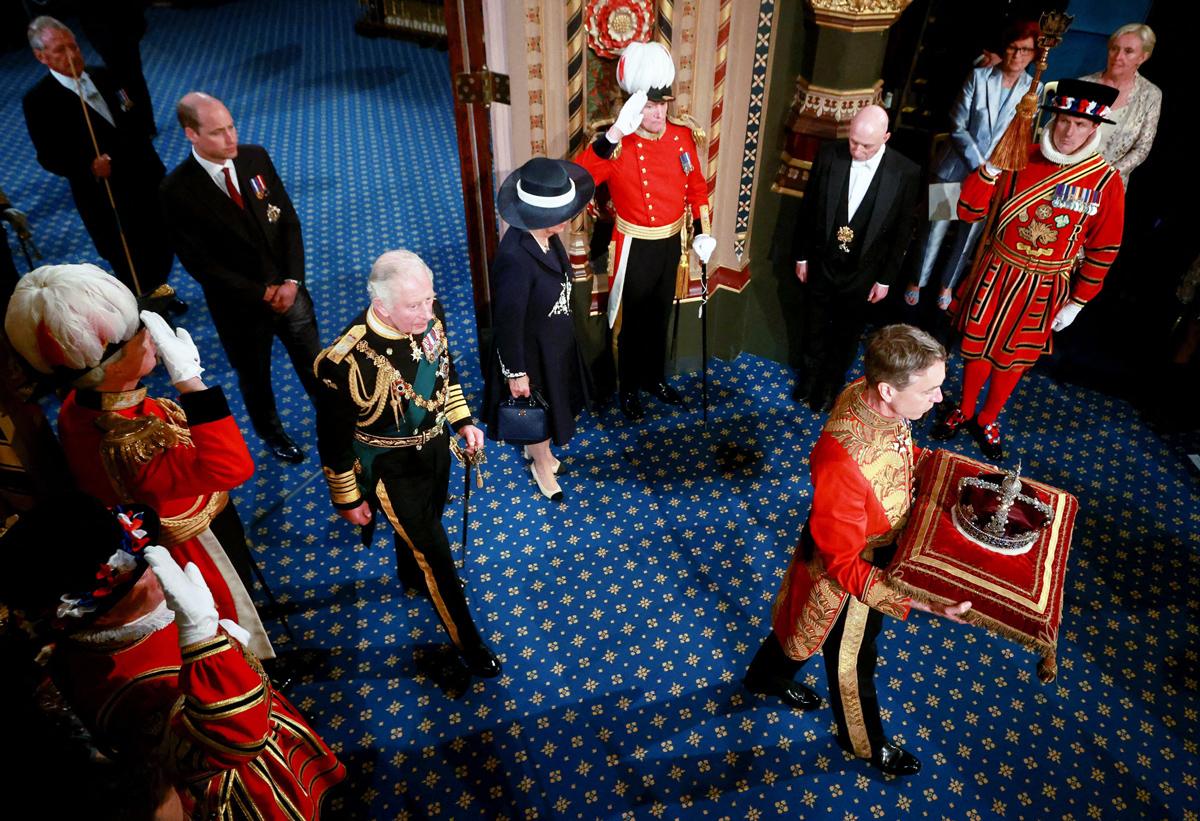Laura Kuenssberg: Why the PM could be drowned out at the King's Speech
- Published

Grab your trumpet! Polish the golden carriage! Dust down the throne! It's nearly time. Time for Charles III to make history, giving the first King's Speech in 70 years.
Time for one of the country's finest ceremonial occasions, when a good chunk of all the King's horses and all the King's men trot from the Palace to Parliament before the monarch makes a speech to MPs, members of the House of Lords and all of us.
Tuesday's speech will be one of those bizarrely British mashups of arcane tradition (10 points if you know what the Cap of Maintenance is) and modern politics.
It's a big moment for a new monarch. And it's the last chance for a government in trouble to introduce a programme of new laws in the hope of shaking them out of the doldrums and grabbing your attention.
New laws take a long time to go through Parliament. So while Prime Minister Rishi Sunak still has at least a year to try to turn things around before he must call an election, the speech is, insiders admit privately, more or less the last chance for the Conservatives to transform ideas into reality - if they want to get them on the statute book before we all go to the polls.
But all the fancy regal fanfares in the world on Tuesday might be drowned out by bigger realities.

King Charles - as Prince of Wales - delivered the Queen's Speech in May 2022 on behalf of his mother for the first time
Top of the list, the conflict in the Middle East. Whether it is the fraught practicalities of helping Brits get out of Gaza, or the diplomatic efforts to coax Israel to pause hostilities there, the conflict is naturally gobbling up political time and energy - and dominating the headlines. Although it is Labour leader Keir Starmer, not Rishi Sunak, who is facing more political pressure on the matter from many within his own ranks.
Next, days of evidence at the Covid inquiry are confirming, in ever-more gruesome detail, just how grim the atmosphere was at the top of government during the pandemic.
And much more important than Dominic Cummings' habit of inventing ever more vile swear words, evidence this week suggested that in a moment of profound national emergency, our government just could not cope.
Memories of those agonising months have been stirred. We have seen in black and white, from messages between senior officials, that the notion of spreading the virus - "herd immunity" like chicken pox - was indeed part of the initial approach that was subsequently denied. And the civil service boss of the Department for Health said, on the record, that the first lockdown was a week too late. Remember just how bitter the political arguments were about the timing of the lockdown, and whether herd immunity had ever been the plan.

On this week's show are Deputy Prime Minister Oliver Dowden, and Labour's shadow defence secretary John Healey
Laura will also be talking to Hossam Zaki from the Arab League, and Sarah Snook, star of the TV series Succession
Watch live on BBC One and iPlayer from 09:00 BST on Sunday
Follow latest updates in text and video on the BBC News website from 08:00

The Covid evidence this week is important for the simple reason that the inquiry is trying to build a complete record of what happened during those months of emergency. But the daily drip of claims hampers Rishi Sunak's ability to move on.
He was the second most senior minister in the government that struggled so badly, described by one of its most senior civil servants as a "terrible, tragic, joke". His "Eat Out to Help Out" scheme, it has already emerged, was branded "Eat out to help the virus" by government medics.
The prime minister consistently tries to present himself to the public as a clean break from several years of chaos. But the inquiry's reminders of the problems of the pandemic, and the political failures, dredge up memories of all that.
Even without those two huge blocks in his political path, is Mr Sunak planning to seize Tuesday as a day of radical action anyway?
Erm… no.
Insiders caution against expecting any shiny new ideas or revolutionary plans. You can read a primer on what might be coming up here.
Some cabinet ministers worry it is all a bit "managerial", all a bit "tinkering", not really talking to the problems millions of voters are facing right now.

PM Rishi Sunak in conversation with Elon Musk, in London on 2 November
The AI summit, and Rishi Sunak's encounter with tech billionaire Elon Musk, complete with dropped consonants and a mid-Atlantic twang, showed that No 10 can generate attention - it can make things happen.
But whether that is translated into an energetic and packed actual programme to get things done on Tuesday? Don't be so sure.
While a senior source says the King's Speech is a "chance to reset the dynamic", don't expect big surprises to make that happen.
You will see laws coming to bring in changes on sentencing that were announced at party conference last month.
You will also likely see a new law on oil and gas licences that will try to set a trap for Labour. It is one of those strange things in politics where sometimes a government will introduce a law that isn't necessarily needed, but will just make life awkward for their opponents. There are divisions in the Labour Party over whether or not new licences should be granted for fossil fuel exploration. If the Tories make them vote on it, that could be politically tricky for Keir Starmer.
So on Tuesday, the biggest fanfare may be from the real trumpets that will sound in Parliament, not political excitement.

After delivering the Queen's Speech in May 2022, Charles and Camilla processed out behind the Imperial State Crown
The ongoing conflict in the Middle East, and last week's revelations from the Covid inquiry, both make it harder for the government to be heard.
But this coming week, a coming reminder of perhaps Rishi Sunak's biggest obstacle. Like any prime minister, he has to deal with "events" beyond his control that can knock any leader off course. The real nightmare though, is how to escape from under the weight of what has gone wrong under Conservative PMs who have gone before.
As King, Tuesday will be Charles's first outing in that grandest of ceremonies in Parliament. Without a dramatic turn for Rishi Sunak, this King's Speech could be this PM's last.

PS: The "Cap of Maintenance" is a red velvet hat, lined with ermine, that is one of the Royal Family's insignia. It's normally carried by the leader of the House of Lords on these big days as part of the procession.
If you got that right, 10 points and your prize, along with everyone else, is to watch the Deputy Prime Minister Oliver Dowden in the studio with me tomorrow morning at 09:00 on BBC One, along with our other guests and a special interview with the Succession star, Sarah Snook.
Follow Laura on Twitter, external